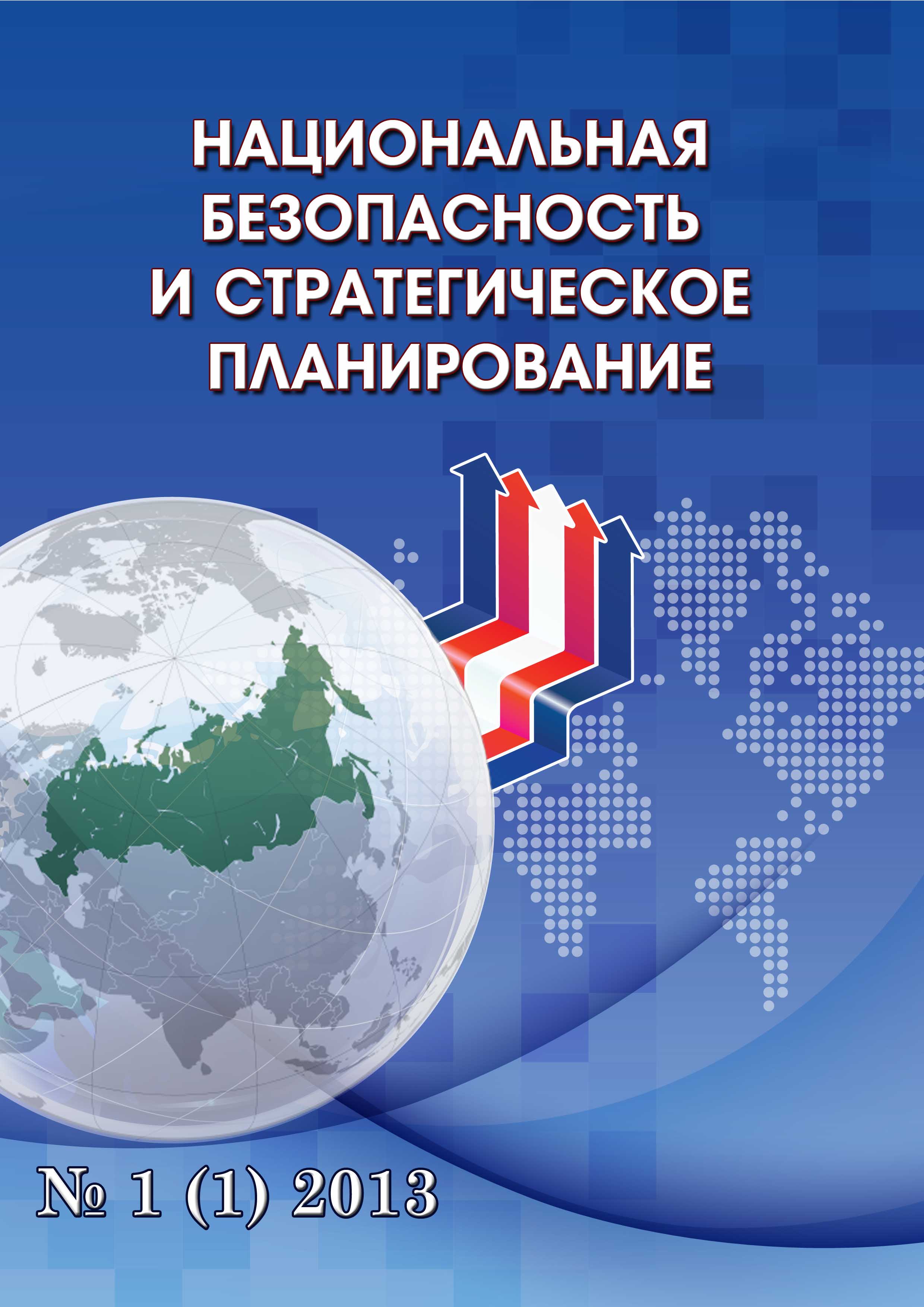Federal research sociological center of the Russian academy of sciences of the Sociological institute of the Russian academy of sciences (associate researcher)
Petrovsky academy of sciences and arts (full member)
Russian Federation
Petrovsky academy of sciences and arts (full member)
Russian academy of sciences of the Sociological institute of the Russian academy of sciences (Federal research sociological center, associate researcher)
Russian Federation
Russian Federation
The article is an analytical review of domestic and foreign studies of strategic culture as a tool of hybrid warfare for the formation of identity in the interests of the political elite and as an analytical tool for the study of security problems. The aim of the project is to systematize the scientific results of relevant research works, generalize the main conceptual and methodological solutions in the study of strategic culture as a tool of hybrid warfare. Methodology. The principles of the methodology of the systematic approach and comparative analysis are used, the analysis and generalization of the studied objects are carried out in order to determine the leading trends in the development of scientific knowledge in the field of the theory of strategic culture. Results. The article shows that within the framework of the fourth generation of strategic culture research, most researchers rely on the definition of the main elements of Johnston's strategic culture concept as a set of common beliefs, assumptions and behaviors based on common experiences and accepted beliefs (both oral and written) that form collective identity and relationships with other groups, and which define the appropriate goals and means to achieve security objectives. The search for new approaches by a number of modern researchers to the conceptualization of strategic culture and modeling of its components is reflected. The importance of the theoretical development of the problem, which appears as one of the most important research tasks, is emphasized, which is confirmed by the increased attention to the study of strategic culture, especially during crisis periods of historical and political development. It is shown that at time in Russia the importance of this tool and its effectiveness were not appreciated, especially in relation to the post-Soviet space, in relation to which the United States and the West conducted systematic work to transform the consciousness of national elites and public consciousness through the promotion of distorted historical narratives through the education system, at the first stage, and through the unleashing of information wars and other instruments of hybrid warfare, and ultimately, by creating real threats to national security at the second stage of changing the strategic cultures of these countries. Currently, an empirical research base remains in demand and is actively being formed as a basis for further development of the main provisions of the theory of strategic culture. An analytical review of the scientific literature confirms the gradual formation of an appropriate conceptual and methodological basis for the study of the problem.
theory of strategic culture, security, hybrid wars, information warfare, identity, public consciousness, political elites
1. Lukin V.N., Musienko T.V. Strategic culture and the risks of maintaining identity // National security and strategic planning. – 2017. – No. 4 (20). – P. 4-10. – EDN VXOZXV.
2. Musienko T.V., Lukin V.N. Theories of value change and politics: traditional and new approaches // Credo New. – 2016. – No 3 (87). – P. 11. – EDN WHXMOV.
3. Snyder J.L. The Soviet Strategic Culture Implications for Limited Nuclear Operations. – RAND, September 1977.
4. Snyder J.L. The Concept of Strategic Culture: Caveat Emptor / In: Strategic Power: The United States of America and the USSR. – London: MacMillan Press, 1990. – 519 p. (P. 3-10).
5. Booth K. The concept of strategic culture affirmed // Strategic Power: USA/Ussr. – 1990. – P. 121-128.
6. Gray C. National Style in Strategy: The American Example // International security. – 1981. – V. 6. – No 2. – P. 21-47.
7. Klein B. Hegemony and Strategic Culture: American Power Projection and Alliance Defense Politics // Review of international studies. – 1988. – V. 14. – No 2. – P. 133-148. – DOI:https://doi.org/10.1017/S026021050011335X
8. Luckham R. Armament Culture // Alternatives. – 1984. – V. 10. – No 1. – P. 1-44. DOI:https://doi.org/10.1177/030437548401000102
9. Klein B. Hegemony and Strategic Culture: American Power Projection and Alliance Defense Politics // Review of international studies. – 1988. – V. 14. – No 2. – P. 136. – DOI:https://doi.org/10.1017/S026021050011335X
10. Erpul O. Strategic Culture and Turkey // Foreign Policy. A Quarterly Journal of the Foreign Policy Institute. – 2014. – V. 41. – P. 51-66.
11. Johnston A.I. Thinking about strategic culture // International Security. – 1995. – V. 19. – No 4. – P. 32-64. DOI:https://doi.org/10.2307/2539119
12. Johnston A. I. Cultural realism: Strategic culture and grand strategy in Chinese history. – Princeton University Press, 1995. – V. 75. – 328 p.
13. Mi X. Mapping Continuity and Change in German Strategic Culture, 1999–2022 // German Politics. – 2023. – P. 1-27. – DOI:https://doi.org/10.1080/09644008.2023.2232308
14. Desch M.C. Culture Clash: Assessingthe Importance of Ideasin Security Studies // Internatioınal Security. – 1998. – V. 23. – No 1. – P. 141-170. DOI:https://doi.org/10.1162/isec.23.1.141
15. Desch M.C. The Culture of National Security: Norms and Identity in World Politics / Peter J. Katzenstein ed. – New York: Columbia University Press, 1996. – 560 p.
16. Musienko T.V. Micropolitics in the modern world. – St. Petersburg: Nauka Publishing House, 2003. – 700 p.
17. Howlett D. The future of strategic culture // Report for the Defense Threat Reduction Agency, 2006. – 19 p.
18. Bloomfield A. Time to move on: Reconceptualizing the strategic culture debat // Contemporary security policy. – 2012. – V. 33. – No 3. – P. 437-461. DOI:https://doi.org/10.1080/13523260.2012.727679
19. Burns A., Eltham B. Australia's Strategic Culture: Constraints and Opportunities in Security Policymaking // Strategic Cultures and Security Policies in the Asia-Pacific. – Routledge, 2016. – P. 22-45. – ISBN: 9781315732183
20. Libel T. Explaining the security paradigm shift: Strategic culture, epistemic communities, and Israel’s changing national security policy // Defence studies. – 2016. – V. 16. – No 2. – P. 137-156. – DOI:https://doi.org/10.1080/14702436.2016.1165595
21. Libel T. Rethinking strategic culture: A computational (social science) discursive-institutionalist approach // Journal of Strategic Studies. – 2020. – V. 43. – No 5. – P. 686-709. – DOI:https://doi.org/10.1080/01402390.2018.1545645
22. Gaskarth J., Oppermann K. Clashing traditions: German foreign policy in a new era // International Studies Perspectives. – 2021. – V. 22. – No 1. – P. 84-105
23. Tappe J., Doeser F. A machine learning approach to the study of German strategic culture // Contemporary Security Policy. – 2021. – V. 42. – No 4. - C. 450-474. DOIhttps://doi.org/10.1080/13523260.2021.1992150
24. Belozerov V.K. Germany Constructs a Strategic Culture // Russia in Global Affairs. – 2023. – Vol. 21, No. 5 (123). – P. 166-177. – DOIhttps://doi.org/10.31278/1810-6439-2023-21-5-166-177. – EDN PGWHLA.
25. Arzamanova T.V. "The Imperative of Strategic Deconstruction": Changes in Strategic Culture and Mentality as Framework Conditions for the Formation of a New Identity of Germany // Actual Problems of Europe. – 2024. – No. 1 (121). – P. 173-195. – DOIhttps://doi.org/10.31249/ape/2024.01.09. – EDN UWAJXX.
26. Korepanov B.O., Lewandowski N.V. National Security Strategy of Germany and its Role in the Formation of a New Strategic Culture of the Country // Interstate Confrontation in the Context of Globalization and its Impact on the Management of National Defense of the Russian Federation, Moscow, August 16, 2023. - M .: Publishing House "UMC", 2023. - P. 254-271. - EDN VGXFLM.
27. Rickover I. The Roots of Israeli Strategic Culture // In book: Cultural Crossroads in the East Middle – Historical, Cultural and Political Legacy of Intercultural Dialogue and Conflict from Ancient Near East to Present Days. – Publisher: University of Tartu Press, 2019. – P. 246-277.
28. Musienko T.V., Lukin V.N. Ukraine: from crisis or to collapse of identity // Permanent round table: History of Russia and the CIS countries in scientific literature and media: facts, events, interpretations: materials of the III round table: "Ukrainian crisis and ways to overcome it". – St. Petersburg. SPbGEU, 2014. – P. 68-77.
29. Lukin V.N. European path or Ukrainian path to Europe // Law, state and civil society in terms of systemic reforms on the way to European integration: Materials of the international scientific and practical conference, Dnipropetrovsk, November 21-22, 2014. – Dnipropetrovsk: Dnipropetrovsk Humanitarian University, 2014. – P. 331-334.
30. Alekseeva T.A. Strategic Culture: Evolution of the Concept // Polis. Political Studies. – 2012. – No. 5. – P. 130-147. – EDN PBMERF.
31. Zerkal D.A., Mukhametov R.S. Foreign Policy Priorities of the European Union in Ukraine: Between Image and Realpolitics // Bulletin of the Irkutsk State University. Series: Political Science. Religious Studies. – 2014. – Vol. 7. – P. 134-140. – EDN RZONTV.
32. Musienko T.V., Lukin V.N. Formation of Identity as a State Task // Credo New. – 2018. – No. 1 (93). – P. 10. – EDN YQMIHA.
33. Beeson M., Bloomfield A. The Trump effect downunder: U.S. allies, Australian strategic culture, and the politics of path dependence //Contemporary Security Policy. – 2019. – V. 40. – No 3. – P. 335-361. – DOI:https://doi.org/10.1080/13523260.2019.1594534
34. Bloomfield A. Issues in Australian Foreign Policy // Australian Journal of Politics & History. – 2018. – V. 64. – No 4. – P. 641-656. – DOI:https://doi.org/10.1111/ajph.12513
35. Wijnja K. Countering hybrid threats: does strategic culture matter? Defence Studies // Defence Studies. – 2022. – V. 22. – No 1. – P. 16-34. – DOI:https://doi.org/10.1080/14702436.2021.194545
36. Blagojević V. Strategic culture and national security // Zbornik Matice srpske za drustvene nauke. – 2019. – No 170. – P. 163-178. – DOI:https://doi.org/10.2298/ZMSDN1970163B.
37. Krasnodębska M., Krasnodębska M. Strategic Culture and the Quest for Ontological Security // Politics of Stigmatization: Poland as a ‘Latecomer’in the European Union. – 2021. – P. 49-80. – DOI:https://doi.org/10.1007/978-3-030-51521-8_3.
38. Menkes J., Kuznar A. Friendshoring: A Strategic Pivot in Global Value Chain Management. July 2024. – DOI:https://doi.org/10.13140/RG.2.2.36738.90569.
39. Xia L. Constructing the russian-chinese strategic partnership from the perspective of national identity // Journal of Political Research. – 2024. – V. 8, No 3. – P. 110-123. – DOIhttps://doi.org/10.12737/2587-6295-2024-8-3-110-123. – EDN KCRCZN.
40. Lauro Borges. On the Geopolitical Origins of Strategic Cultures and Alliances: The Chinese-Russian Case // Conference: International Conference on Economics, Business, Tourism & Social Sciences At: – Abu Dhabi and online. July 2022. URL.: https://www.researchgate.net/publication/362456208_On_the.
41. Valizadeh A., Kazemi S. The Influence of Strategic Culture Components on Bilateral and Regional Relations between Iran and Russia //Central Eurasia Studies. – 2022. – V. 15. – No 1. – P. 387-410. – DOI:https://doi.org/10.22059/jcep.2022.337629.450051.









